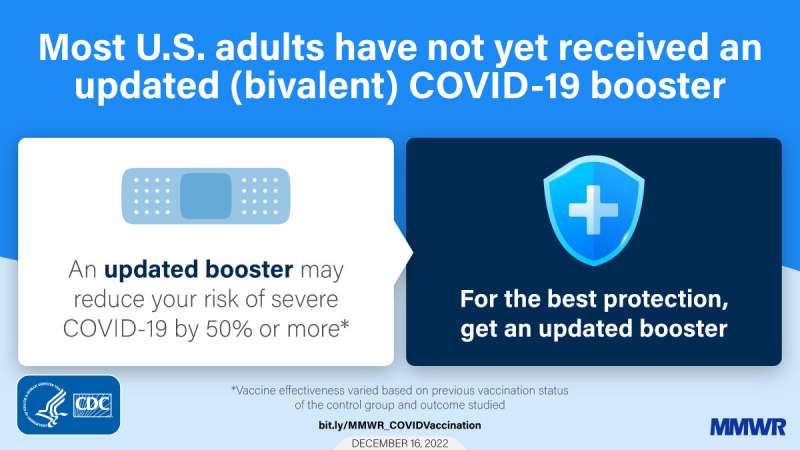Real-world data study confirms bivalent mRNA booster vaccines associated with greater short-term protection

One of the first real-world data studies comparing the new bivalent mRNA COVID-19 booster vaccines with the original monovalent vaccines reports the bivalent conveyed greater short-term protection against symptomatic COVID-19 infection in adults.
The multi-state study from the Centers for Disease Control and Prevention's VISION Network found that the bivalent booster dose provides greater short-term protection against symptomatic COVID-19 infections which generate emergency department and urgent care visits or hospitalization, compared to prior receipt of two, three or even four doses of first-generation vaccines without a bivalent booster vaccine.
How well the bivalent shots protect against COVID-19-associated medical visits had previously been largely unknown.
"This study clearly shows the benefit conveyed by a bivalent booster vaccine—lowering the risk that you will have to go to the E.D. or be hospitalized due to COVID," said study co-author Shaun Grannis, M.D., M.S., vice president for data and analytics at Regenstrief Institute and Regenstrief Professor of Medical Informatics at Indiana University School of Medicine.
The study found that from mid-September to mid-November 2022, adults who had received bivalent COVID-19 booster vaccines made 57 percent fewer COVID-19 related emergency department or urgent care visits compared to adults without prior vaccination and 51 percent fewer visits compared to adults who first had received monovalent vaccines.
Bivalent booster vaccine effectiveness against hospitalization was also significant—61 percent compared to adults without prior vaccination and 44 percent compared to adults who were vaccinated with first generation vaccines.
Among adults who had completed a primary vaccine series or one or more monovalent boosters, greater time since the most recent dose was associated with greater relative protection following the bivalent booster vaccine.
Data from immunocompromised individuals were not included in this study of the effectiveness of bivalent mRNA vaccines.
The authors conclude, "These findings support efforts to improve coverage with bivalent vaccines, although optimal timing for receipt of bivalent vaccine booster doses needs to be established. All eligible persons should stay up to date with recommended COVID-19 vaccination, including receiving a bivalent booster dose. In addition, persons should consider taking other precautions to avoid respiratory illness this winter season, including masking in public indoor spaces, especially in areas where COVID-19 community levels are high, to protect themselves and others and reduce strain on the health care system during an ongoing surge in multiple respiratory viruses."
"Early Estimates of Bivalent mRNA Vaccine Effectiveness in Preventing COVID-19–Associated Emergency Department or Urgent Care Encounters and Hospitalizations Among Immunocompetent Adults—VISION Network, Nine States, September–November 2022," is published in the CDC's Morbidity and Mortality Weekly Report.
More information: Mark W. Tenforde et al, Early Estimates of Bivalent mRNA Vaccine Effectiveness in Preventing COVID-19–Associated Emergency Department or Urgent Care Encounters and Hospitalizations Among Immunocompetent Adults—VISION Network, Nine States, September–November 2022, MMWR. Morbidity and Mortality Weekly Report (2022). DOI: 10.15585/mmwr.mm715152e1





















